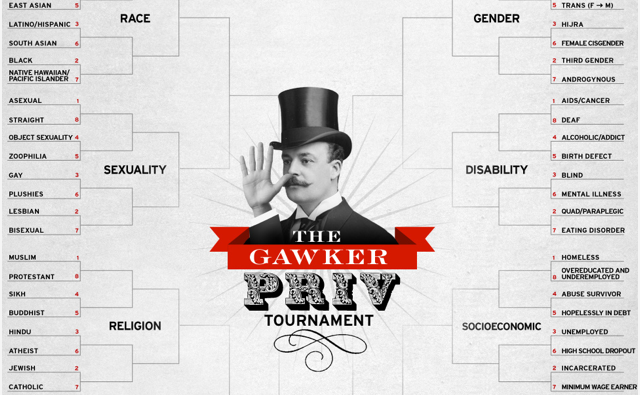Only a few years ago, “privilege” was a concept you’d more likely hear discussed on college campuses and other places where people think a lot about how to achieve social justice than in a national publication. Recently, however, the idea—roughly summarized, that we should investigate, acknowledge, and challenge the various benefits that we enjoy, usually without any effort, due to socially marked categories like race, ability, or gender expression—has broken through to mainstream Internet discussion, and the result hasn’t been pretty. In fact, what was designed as a useful tool for thinking critically about structural inequality has become a public pissing match of oppression; Gawker’s launch today of a “Privilege Tournament” only acknowledges the absurd depths to which the discussion has sunk. Click over, and regardless of your own unique intersectional subject-position, you, too, may vote on who is the least privileged between rivals like Native American vs. East Asian and Intersex vs. Male Cisgender. In the end, the bracket promises to determine who is the most abject of them all.
Some may call it trolling, but the “Privilege Tournament” really only acknowledges that privilege has failed as a social justice strategy, at least outside of more nuanced environs like the academy. During my liberal arts days, one of the most useful experiences I had was participating in an exercise in which everyone stood in a line and certain “privileges” were read out—for example, “Attending college for you was never a question of money,” or “When you go shopping, security does not follow you around.” Those who enjoyed one would step forward while those who didn’t were left behind. In a half-hour or so, I became aware of benefits that I enjoy as a white man that I’d never thought about, as well as remembering ones I didn’t accrue because I was gay. The experience was unsettling—in a good way—and continues to be useful as I move through the world.
But denuded of situational context and reduced to a competition between arbitrary categories, the wider privilege discussion has become about points and team pride, winners and losers. In my case, +1 for gay (and maybe .5 for being a little femme), but -5 for white, male cisgendered, middle-class, able-bodied, and allergy-free. So a total of -3.5, tsk tsk. This kind of quantitative score-keeping was never the point. And worse, the turning of privilege into a game has led some to use it to disqualify those deemed to have “too much” from not only participating in the fight for justice, but from even cheering from the sidelines. The ethos of “be quiet, you have too much privilege” is wildly counterproductive, and definitely not the point of any critical exercise. Call me naive, but I like to think that though we definitely live within powerful, powerfully messed-up structures of inequality, we are occasionally able to transcend our own limited (and perhaps unfairly advantageous) position within that web to not only acknowledge it shamefully, but to also maybe even do something about it.
I don’t have any great ideas for what should replace privilege—which is unfortunate, because we surely need strategies for discussing and dealing with entrenched, passive social inequality. But once Gawker declares the “winner,” let’s put down the privilege scorecard and move on. The game’s not fun anymore.
